Psoriasis is a non-infectious chronic skin disease. According to statistics, 3. 7% of the world's population suffers from psoriasis. People call this disease "scaly lichen".
Psoriasis does not distinguish between genders and is not contagious; it is most common between 14-27 years of age. The disease is characterized by the appearance of red scales in the form of plaques (spots) covered with white scales. One spot (or several spots) can appear on any part of the body, but the most common ones are thin and dry skin: elbows, knees, waist, scalp.
The spots vary in size and the way they interfere: some patients only notice skin irritation; in others, large areas of skin are affected, accompanied by discomfort, itching, pain, insomnia, and reduced quality of life.
Psoriasis is a chronic disease characterized by periods of exacerbation (rash) and remission (subsidence of symptoms).
Psoriasis often complicates pregnancy.
Causes of psoriasis
Psoriasis is a systemic process that involves not only the skin, but also the entire body. The cause of psoriasis is not fully understood, but it is speculated that there are several of them: neurogenic (due to stress), hereditary, infectious, viral, mixed (staphylococcus invading skin damage, and combining any of the above reasons))Wait. In this case, cellular and humoral immunity is activated and triggers an autoimmune process that damages cells, mainly skin cells (epidermis).
In addition to activating immune function, metabolism can also be disturbed. This disease is aggravated by an increase in genetic burden. As a result, the renewal (regeneration) of cells is accelerated 3-5 times-the formation of psoriasis plaques on the skin.
If not treated in time, the disease will aggravate: skin spots grow, crack, ulcerate; nails are damaged, joints are affected, etc.
80% of the quality of life of patients with psoriasis depends on timely diagnosis and appropriate treatment.
Let's list again the factors that lead to the onset of the disease:
- Bad genetics. Scientists have identified 9 genes that determine the development of the disease, but the interaction between them is unclear. As we all know, in 15% of cases, psoriasis is inherited by relatives of the first and second generations;
- Stress, nervousness, depression. It has been proven that in 70% of cases, stress can worsen psoriasis;
- hormone imbalance;
- Ecological disorder
- Metabolic disorders, drug addiction;
- Colitis and parasitic infections (roundworms, blue worms, intestinal infections, etc. );
- Viral infection;
- Streptococcus; Candidiasis of the skin;
- allergy.
Psoriasis symptoms
In the initial stage, the psoriasis rash appears as red patches (spots) and scales. The appearance of skin patches is accompanied by intense itching. A denser (stratum corneum) layer is found under the scales.
Here are the 6 main forms of psoriasis; everyone has their own symptoms:
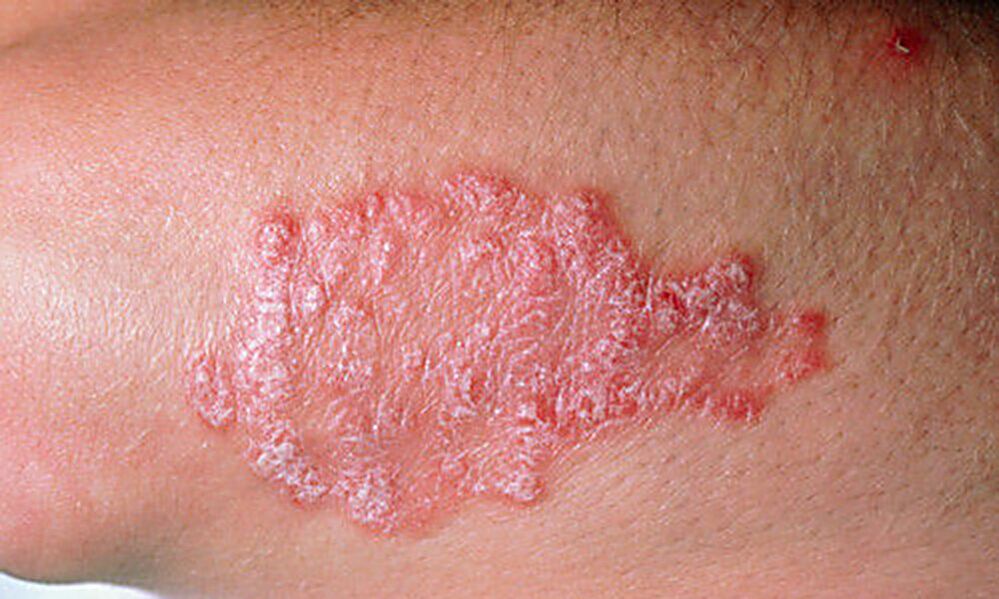
85% of patients will develop plaque psoriasis. It is characterized by a dry pink rash, raised above the skin, covered with silver scales. The skin in the affected area often falls off; in this place, the red spots are still there and bleed during trauma. In 60% of cases, the plaques merge into large plates.
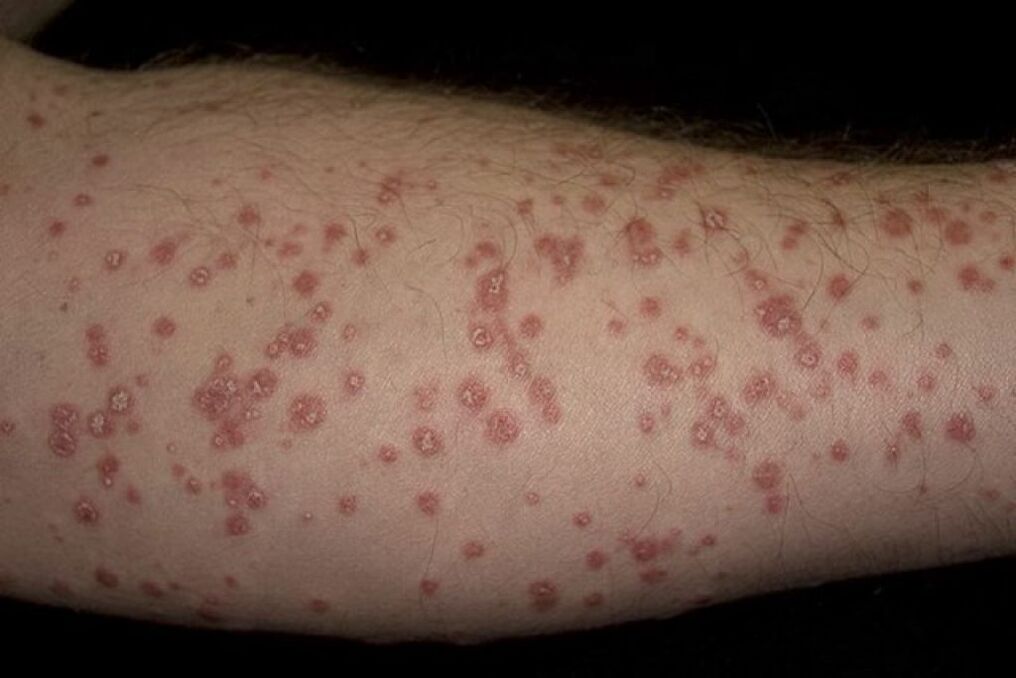
Globular psoriasis is characterized by many small, dry lesions that appear in the form of pink droplets above the surface of the skin. The rash is located on the thighs and legs and affects most areas of the body. In 60% of cases, globular psoriasis worsens after streptococcal infection.
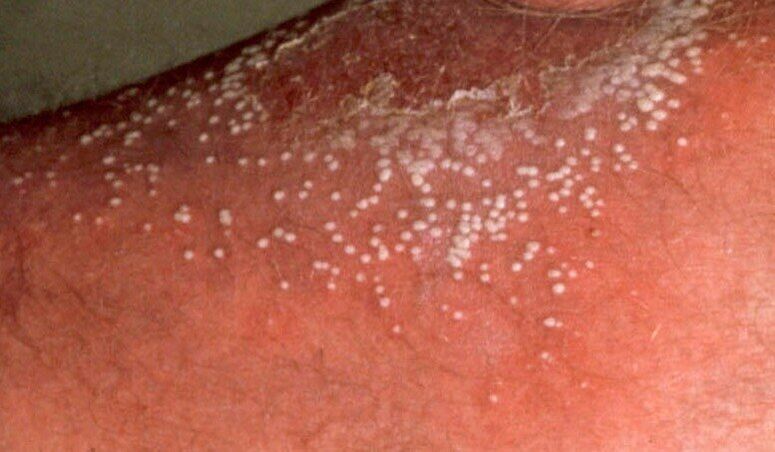
Pustular psoriasis can be identified by skin blisters filled with clear liquid. The blisters are surrounded by red, edema, and peeling skin. The legs and thighs are more often affected.
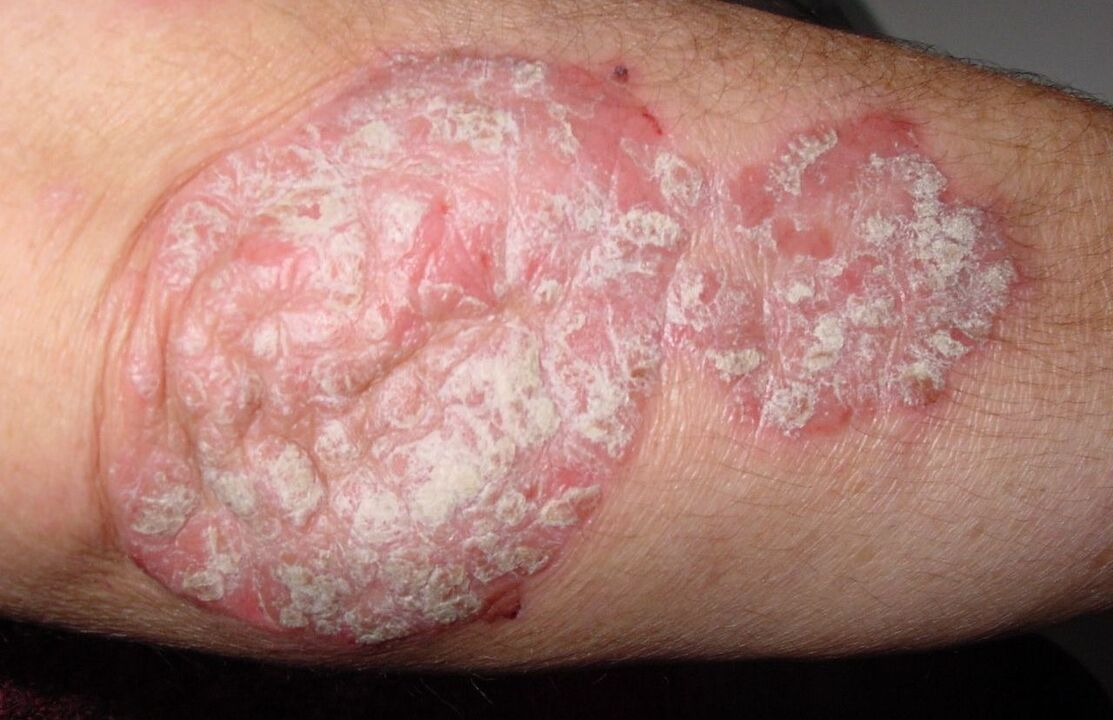
Psoriasis on the surface of the flexor muscles manifests in the form of smooth, non-flaky erythema, which are located in the skin fold areas: the outer thighs, the armpits and the external genital area. Due to mechanical stimulation (physiological friction), the spots can be injured, bleed and ulcerate.
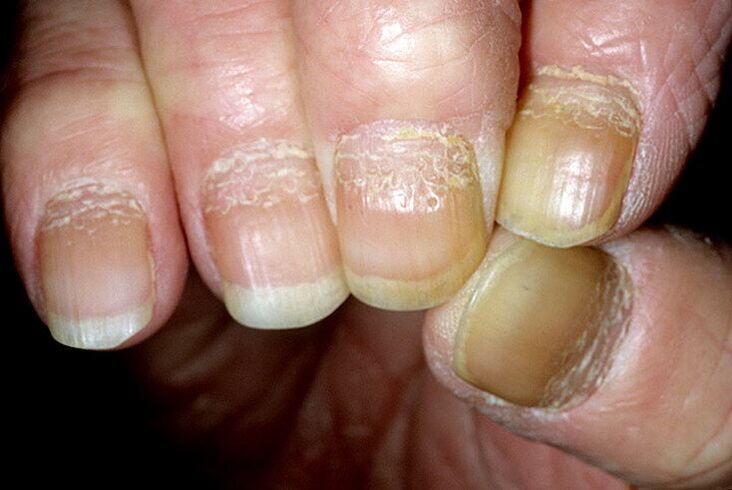
Psoriasis of the nails is manifested as discoloration, spots and stripes appear on the nails. The skin around the lesion becomes hard. As the disease progresses, the nails peel off, thicken, and then dry or fall off.
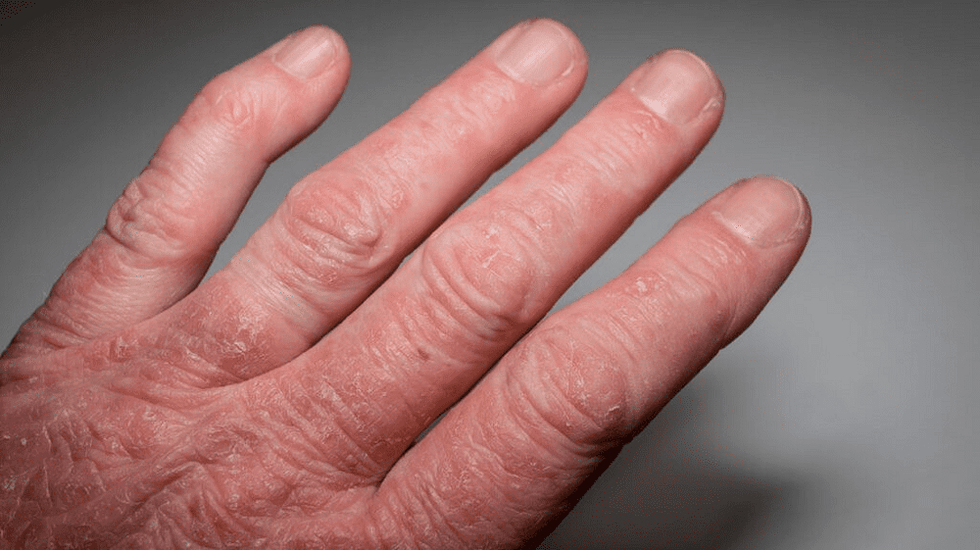
Psoriatic arthritis (15% of cases). Any joint will be affected, but the more common are the small joints-the phalanx of the hands and feet. The fingers become like sausages. Psoriasis of the joints can cause bursitis, a person's disability.
Let's talk about the lesions of the head and elbow respectively.
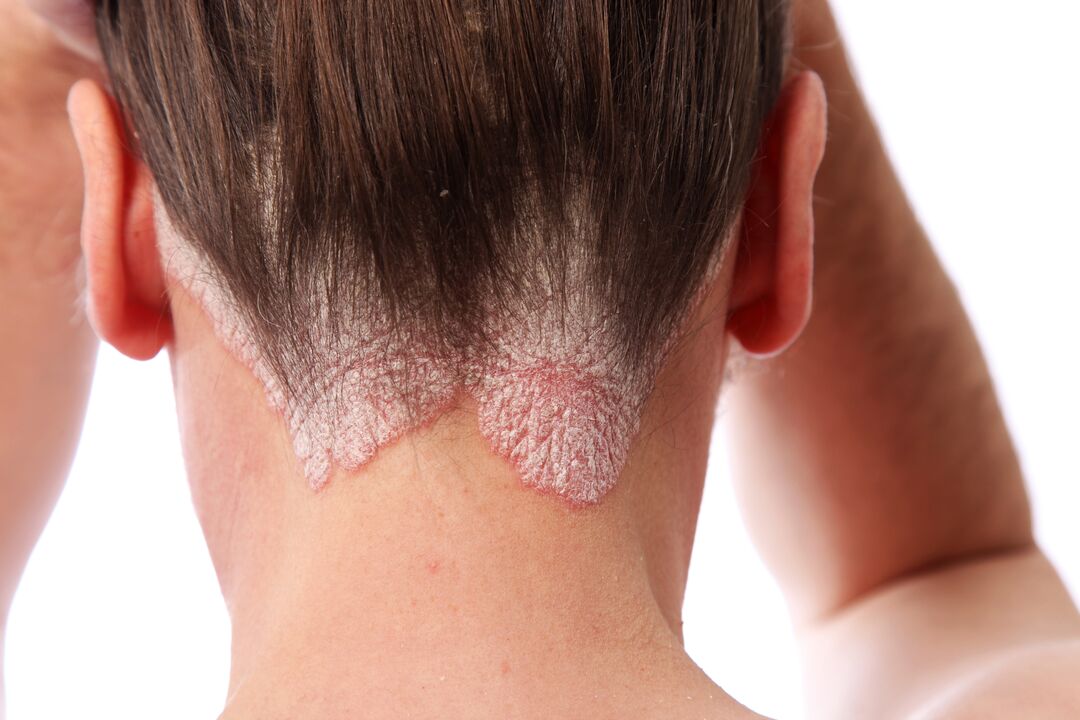
Scalp psoriasis (mainly scalp) is the most common form of the disease. It is more common when you are young. It appears as itchy and itchy red flaky spots. Redness is almost always obvious, so it can cause emotional discomfort and lead to a person's social isolation.
Elbow psoriasis is a disease of middle-aged people. It manifests as a rash on the surface of the extensor muscles of the elbow joint. The rash spreads outward and merges-forming a large patch (plaque), covered with silver that can easily fall off the scales. A thin protective film fell off with the scales, exposing the bleeding surface. In 80% of cases, the spots disappear on their own without treatment, but sometimes they thicken (grow old) and persist for several years, causing psoriatic lesions in the elbow joint.
Diagnosis of psoriasis
The diagnosis and treatment of psoriasis are carried out by a dermatologist.
Due to characteristic skin lesions, the diagnosis of psoriasis is simple. As an additional laboratory test, a general blood test and determination of rheumatoid factor are used. For the diagnosis of psoriatic arthritis, it is necessary to consult a rheumatologist and perform X-ray examinations of the affected joints. In rare cases, skin biopsy is performed for differential diagnosis.
Psoriasis should be distinguished from similar skin diseases: seborrhea, lupus, etc.
Psoriasis treatment
Psoriasis is a chronic disease that has an exacerbation period (the rash reappears) and a remission period (the rash disappears). It is never possible to recover from psoriasis. You can extend the remission period and reduce the intensity of the deterioration.
Only 40% of cases can find an effective treatment immediately. Sometimes it takes months or even years. Therefore, psoriasis is treated at home, except for severe deterioration and complications. The therapeutic effect is affected by the type of psoriasis, age, and concomitant diseases. For mild psoriasis, topical preparations are prescribed: ointments and creams based on:
- Glucocorticoids;
- Zinc
- Asphalt;
- Salicylic acid;
- Vitamin D3.
In severe cases of psoriasis (25% of the skin surface is affected, joint damage) and local treatment is ineffective, a combination therapy is prescribed:
- Cytostatic agents that inhibit the division of epidermal cells;
- Immunomodulators that normalize the immune response;
- Glucocorticoids can regulate metabolic processes and reduce inflammation;
- Non-steroidal anti-inflammatory drugs (to reduce skin itching);
- Various vitamins.
Prescribe physical therapy: ultraviolet radiation, cryotherapy, plasma exchange, leech therapy. Folk remedies are also used: ointments based on celandine and lard, spiraea and petrolatum, beeswax and lard. To normalize immunity, they drink homemade oatmeal kvass, bay leaf infusion and dill soup.
Diet, especially when psoriasis worsens, plays an important role. Spicy and sweet dishes are excluded from the diet. Fast food and alcohol are prohibited. Nutrition should be balanced, rich in vitamins and minerals.
To prevent psoriasis from getting worse, you need to improve your health and avoid stress, hypothermia, and seasonal diseases.
The following are simple rules to prevent the worsening of psoriasis:
- Don't make the skin excessively dry;
- Avoid prolonged exposure to the sun;
- Avoid skin injury;
- Avoid stress
- Don't smoke or drink alcohol.
Psoriasis contagious?
During the family or other contact period, there was not a single confirmed case of psoriasis spread from the patient. Therefore, people think that psoriasis is not contagious.
Which doctor to contact
To start prompt treatment and avoid the spread of psoriasis, consult a dermatologist. In the presence of psoriatic arthritis, a rheumatologist needs to be consulted.























